In the News | Older
 |
In the NewsAugust 25, 2017Political science debuts on MITxLeda ZimmermanMIT NewsEvan Lieberman, the Total Chair on Contemporary Africa, creates the first MIT Political Science class for edX, the multi-university online education platform. The course, Democracy and Development: Perspectives from Africa, launches Setember 26. |
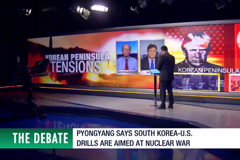 |
In the NewsAugust 22, 2017Tensions on Korean peninsulaPressTV-The DebateJim Walsh discussed North Korea's warning of deepening tensions on the Korean Peninsula following the recent joint military exercises by US and South Korea. |
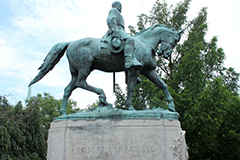 |
In the NewsAugust 18, 2017What Robert E Lee wrote to The Times about slavery in 1858Jacey FortinNew York TimesOne day in January, a few years before the Civil War, Robert E Lee wrote to The New York Times, seeking a correction, writes former CIS Neuffer fellow Jacey Fortin. Fortin now reports full-time for the The New York Times. |
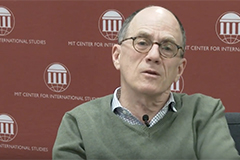 |
In the NewsJuly 10, 2017Former head of US counterintelligence on “US-Russian cybersecurity unit”Mary Louise KellyWBUR Morning EditionJoel Brenner, now at MIT, says President Trump's statement that he might partner with Putin on cyber issues is a reversal of decades of well-founded American suspicion of Russia. |
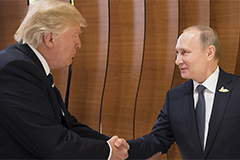 |
In the NewsJuly 9, 2017Trump's cyber tweets cause dismay, confusionCorey BennettPoliticoThe attempt at cooperation itself could result in the US exposing even more secrets to a country that has already stolen so many, cautioned former Obama administration official David Edelman, director of the new MIT Project on Technology, the Economy, and National Security. |
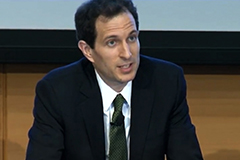 |
In the NewsJuly 7, 2017Justin Steil on the Trump administration travel banMichelle NhuchMIT NewsRegardless of the Supreme Court’s ultimate conclusion about the legality of the current executive order, its mean-spiritedness, short-sightedness, and damage it has done, and will continue to do, are already evident. |
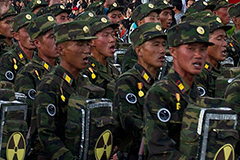 |
In the NewsJuly 5, 2017What's changed since the missile test?NPR Here and NowThe latest test demonstrates an underlying disconnect in US strategy: North Korea can make missiles faster than we can punish them. Listen to Jim Walsh on NPR's Here and Now. |
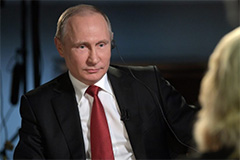 |
In the NewsJune 7, 2017Brenner on Russian hacking effortCaitlin O'Keefe, Meghna ChakrabartiWBUR Radio BostonJoel Brenner, former NSA Inspector General, discusses the leaked NSA document analyzing a Russian military intelligence cyberattack on a US voting software company; and the alleged leaker, an NSA contractor, who has been arrested.
|
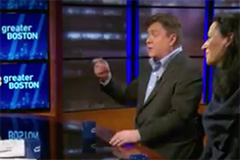 |
In the NewsMay 25, 2017Halting intelligenceWGBH NewsJim Walsh, from MIT's Security Studies Program, discusses the effects that intelligence changes could have on the US—and politicians who take the term “beat the press” literally. |
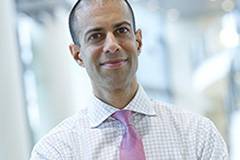 |
In the NewsMay 24, 2017Vipin Narang: On the brinkmanship beatLeda ZimmermanMIT NewsNarang, who specializes in nuclear security, proliferation, and deterrence, is closely monitoring the ongoing rivalry between India and Pakistan, and the alarming, increasingly bellicose sparring between North Korea and the United States... |
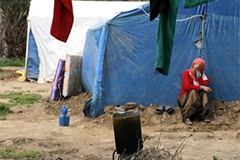 |
In the NewsMay 22, 2017How political science contributes to national policies on immigration and military conflictMIT SHASS CommunicationsMIT News"It is remarkable that we do not measure the costs of war in any meaningful way," says John Tirman. "I suggest that Congress establish a conflict impact assessment during or after each war to bring home the true costs of armed conflict." |
 |
In the NewsMay 18, 2017Patching the electric gridRachel LayneMIT Technology Review“For the sake of efficiencies…we have created tremendous risk for ourselves,” warns Joel Brenner, the principal author of the MIT report on cybersecurity. Now, he says, people are waking up to the danger. |
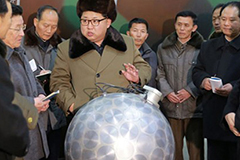 |
In the NewsMay 17, 2017Walsh on North Korea nuclear issuesMark GoldbergGlobal DispatchesJames Walsh discusses nuclear diplomacy with North Korea in respect to the recently elected Moon Jae-In as president of South Korea. Listen to the Global Dispatches podcast. |
 |
In the NewsMay 16, 2017US and Mexico: What’s the way forward?Peter DizikesMIT NewsOver the past two years, US-Mexico relations have taken a distinctive turn, largely stemming from the agenda President Donald Trump has brought to US politics...The MIT Starr Forum offers a look at how the neighboring countries could revive relations. |
 |
In the NewsApril 20, 2017Guillemin on the sarin attack in SyriaMichelle NhuchMIT NewsJeanne Guillemin, a medical anthropologist and a senior fellow in the MIT Security Studies Program, discusses the April 4 attack on Syrian civilians that killed at least 80. |
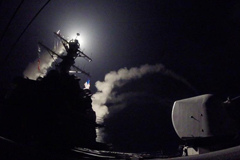 |
In the NewsApril 7, 2017Strike on Syria is defensible but problematicMichael A. CohenBoston GlobeBarry Posen comments in the Boston Globe, “…one of the great ironies of Trump’s decision to use force is that is actually in direct support of President Obama’s 2013 negotiated agreement with the Syrian government…” |
 |
In the NewsApril 5, 2017MIT report to combat cyber threatsColin GrantBBCJoel Brenner, former NSA inspector general and CIS senior research fellow, speaks to BBC reporter Gareth Mitchell about the recent MIT report on cyber security that examines threats to the nation’s infrastructure. |
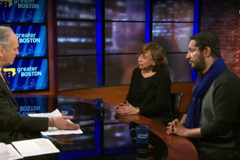 |
In the NewsApril 5, 2017Crisis in SyriaWGBH NewsCarol Saivetz, a senior advisor at MIT’s Security Studies Program, is featured on WBGH's "Greater Boston" to discuss the crisis in Syria. |
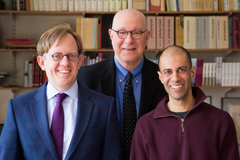 |
In the NewsApril 3, 2017MIT's experts in Asian securityLeda Zimmerman, Emily HiestandMIT NewsTaylor Fravel, Richard Samuels, and Vipin Narang train the next generation of scholars and security policy analysts; counsel national security officials in the US and abroad; and inform policy through publications and frequent contributions to public debates. |
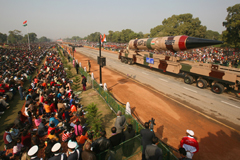 |
In the NewsMarch 31, 2017India, long at odds with Pakistan, may be rethinking nuclear first strikesMax FisherThe New York TimesThis would be more than an arms race, said Vipin Narang, “It’s very scary because all the ‘first-strike instability’ stuff is real…” Shivshankar Menon, India’s national security adviser (2011-2014) and recently at CIS as a Robert E. Wilhelm Fellow, is also quoted. |


